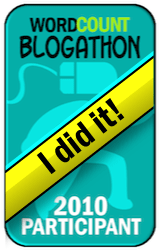As part of the May challenge, the WordCount Blogathon hosts theme days. Last week, as a group, we blogged about movies that have inspired our writing or blogging. Today, it's Guest Post Day.
Stepping in for me is Peggy J. Noonan, a health writer whose interest in alternative medicine mirrors my interest in the mind-body connection. I wouldn't have been able to develop the BIKE metaphor without it. When Peggy's not writing for magazines, newspapers, books and online publications, she's sharing news and tips about how to use alternative medicine at her blog, AltMedForYou. That's where you'll find me today, reviewing Spontaneous Happiness, a book written by Dr. Andrew Weil, a Tucson celebrity and director of the Arizona Center for Integrative Medicine. You can find more information about Dr. Weil at Peggy's blog. Today at BIKE WITH JACKIE, Peggy's advancing our knowledge about positive visualization...
Jackie’s May 4 post
describing how positive visualization worked for her was inspiring. It reminded
me of Laura Wilkinson, the platform diver who won the Olympic gold medal in
2000 by using positive visualization when a foot injury prevented her from
practicing for a couple of months before the competition.
Laura’s success in that event
was so dramatic and so impressive that afterward other divers adopted it and
improved their performance too.
Imagine standing up on a
diving platform, with all the world watching, as you walk confidently to the
platform and go into your dive, not even considering for a second that your
achievement would be anything less than perfect.
I remember hoping she could
succeed, but not really expecting she would. After all, everybody knows the key
to physical performance success is physical practice, right? And, although those of us in the TV
viewing audience might be fervently hoping for a Cinderella success, I doubt
any of us thought it could really happen. Win a medal after missing months of
practice? Nah, not likely.
But she did it. Her
performance won the gold in one of those goosebump-thrilling moments that never
seem believable in movies but knock your socks off when they happen in real
life.
Later, I remember her telling
reporters the two secrets that made positive visualization work for her were
making the visualized practice intensely vivid and real in her mind and
believing it would succeed.
That same technique is being
applied to healing by practitioners of alternative medicine. Does it work? Conventional
medicine is skeptical but to alternative medicine doctors, the answer is a
resounding yes. A no brainer, especially in cancer treatment that employs meditation,
guided imagery, and visualization with Qi Gong (sometimes called Chi Gong), Tai
Chi, Tibetan Yoga, and other and mind-body practices.
It has been said that the
body can’t tell the difference between something that really happened and
something you imagined vividly. As in sports, making it work is simple:
1) Pick a clear and specific target.
Jackie visualized how she would sit, how she would push off the chair, how she would use her poles, how she would make a successful exit onto the snow.
2) Relax.
Visualization works better when your mind is calm and clear. Set other concerns aside and focus. A few deep belly breaths can help you shift into a receptive state of relaxed awareness.
3) BE in that moment.
Make it as vivid and immediate as you can. Like the Olympic divers, feel the successful dive down to the tiniest detail of how the air moves against your skin as you step onto the platform and what the texture of the board feels like against the soles of your feet.
4) Believe.
Make it true in your mind and it can become true in reality.
What do you think about positive visualization? Is there something you could try it out on this month?
1) Pick a clear and specific target.
Jackie visualized how she would sit, how she would push off the chair, how she would use her poles, how she would make a successful exit onto the snow.
2) Relax.
Visualization works better when your mind is calm and clear. Set other concerns aside and focus. A few deep belly breaths can help you shift into a receptive state of relaxed awareness.
3) BE in that moment.
Make it as vivid and immediate as you can. Like the Olympic divers, feel the successful dive down to the tiniest detail of how the air moves against your skin as you step onto the platform and what the texture of the board feels like against the soles of your feet.
4) Believe.
Make it true in your mind and it can become true in reality.
What do you think about positive visualization? Is there something you could try it out on this month?












3 comments:
If nothing else, visualization soothes me, calms me and just makes be BELIEVE I can do it...and I am usually right.
What a perfect way to say it, Barb. You've captured the essence of positive visualization and I love the way you're making it work for you!
The first time I encountered the concept -- that is, other than the childhood "Little Engine That Could" story with its "I think I can...I think I can...I did! I did!" message of believing creates success -- was when I read a book called Psycho-Cybernetics by Maxwell Maltz, PhD. It's been years and I don't have the book anymore but as I recall, his focus was on how to use the concept of visualization to change your life (not so much your health) - like "manifesting" and "law of attraction" today.
I think it is truly amazing what the mind can do. Thanks for the great comment -- and thanks to Jackie for letting me share her space for a day.
You're welcome, Peggy. It was great to have you.
Post a Comment